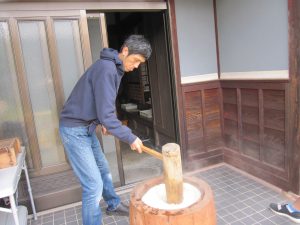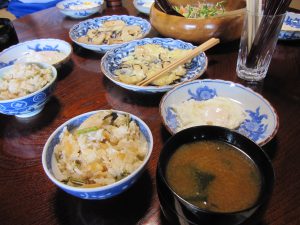Can Ikigai Diet Help Dementia?
That is a question I have been asked recently.
To answer this question, I need to clarify first that Ikigai Diet isn’t designed to cure any specific type of disease, nor it is designed to help you lose weight.
It is a diet for people in general who want to lead a long, healthy, and happy life. We are looking into a long term lifestyle, not a short term diet program designed for symptomatic treatment.
In that sense, the answer is no, Ikigai Diet can’t help dementia.
If you have a specific problem, seek the advice of your physician or other qualified health providers first.
With this in mind, let’s look into some ways to deal with dementia because one of the principles of Ikigai Diet is to be independent. You want to self educate yourself about health so that you can always make informed decisions when you speak to your doctors or encounter any diet or healing programs. You can take in charge of your well-being. Proactive living rather than reactive living is one of the keys of Ikigai Diet.
There are many elements to consider when we think of dementia; physical exercises, mental excises, diet, living environment, and social life.
These elements are all vital as factors of longevity in Blue Zones; five areas in the world where people live the longest.
Another word, by modeling the lifestyles of Blue Zones, you are more likely to prevent developing dementia.
I will deal with each element, but today I will talk about diet.
Fostering your healthy gut microbiota
As I explained in the page Gut Microbiota, the most important thing in Ikigai Diet is to improve the environment within your intestine. That is the basic to deal with any physical or mental conditions. Eat well to support your gut microbiota regularly so that you will have a strong immune system which can protect you from many diseases. There is growing evidence suggesting a strong connection between the gut microbiota and physical diseases, and recently there are some researches stating that the gut microbiota has a lot to do with your brain function. In Japan, the intestine is regarded as the second brain.
One type of food that can be a feed for bacteria living in your gut is fermented food; miso, soy sauce, natto, tempeh, and pickles.
Dietary fiber is another type of thing that can be a feed to your intestinal bacteria. Foods containing dietary fiber are whole grains, vegetables such as broccoli, cabbage, Kale, carrots, squashes, and corns, beans such as soybeans, nuts like almond and walnuts. Sweet potatoes and taros are rich in dietary fiber, too.
You can see how natto can be a superfood since it is fermented and rich is dietary fiber.
To support your gut, you not only want to pay attention to what foods you can eat, but also how you can eat them; how many times you need to chew, for example. In the book Ikigai Diet, I explained how to eat to support your gut in detail.
Foods which support our brain health
What kinds of food are supposed to be good especially for our brain? Here are some foods seemingly beneficial for the brain after searching on the internet.
Green leafy vegetables
Green leafy vegetables such as Kale, spinach, broccoli, collards are considered to be good for the brain since they contain a lot of vitamins A and C and other nutrients, which support your brain function.
Nuts
Nuts are also good for brain health. They contain healthy fats, fiber, and antioxidants.
Berries
Berries are also recommended in many sites as the foods for the brain. Blueberries and strawberries seem to have good effects on cognitive function. Berry fruits contain high levels of antioxidants. They also change the way neurons in the brain communicate.
Beans
Beans provide additional energy from protein and complex carbohydrates as well as dietary fiber and loads of vitamins and minerals. Beans are said to keep your mind sharp.
Whole grains
Whole grains are thought to be beneficial for your brain, as well. They provide glucose which the brain needs for energy throughout the day. The fiber in the whole grains helps regulate the release of glucose. And the vitamin B that it contains makes sure your nervous system stays healthy.
Fish
Fish is rich in omega 3 fatty acid such as EPA and DHA, and they are thought to protect brain function.
Poultry
Poultry is another type of food which is regarded as beneficial for your brain. Chicken is a good source of dietary choline and vitamins B6 and B12. Choline is an essential building block in acetylcholine, a brain chemical that helps memory.
Eggs
Eggs also contain vitamins B6 and B12, and choline.
Olive oil
Olive oil is getting a lot of attention as a superfood recently and it is supposed to be good for brain health, too. It appears that olive oil helps protect against Alzheimer’s disease by stimulating a process in the brain called autophagy, which is a kind of detoxification system in your brain.
Wine
Drinking too much alcohol can slow down your brain function, but a moderate amount of alcohol intake is said to be better than not drinking it at all. A glass or two of red wine is especially considered to be good for your brain. Red wine can tamp down inflammations and “clean” the brain by getting rid of toxins, including those associated with Alzheimer’s.
What does Ikigai Diet recommend?
Now let’s look at the foods which are supposed to be good for the brain from the point of view of Ikigai Diet.
As I said before, eating well to foster a healthy gut microbiota is the number one priority in Ikigai Diet, and some of the food recommended as brain health foods are good for the intestine but some of them aren’t.
Green leafy vegetables, nuts, berries, beans, and whole grains are beneficial for your gut, too. A lot of them contain dietary fiber which feeds your intestinal bacteria.
Beans, especially soybeans are good, but you need to be careful how they are produced. A lot of soybeans are genetically modified these days, so get organic GMO free beans.
Fish can be good depending on what type of fish you eat. I would avoid farmed fish because often antibiotics are used in order to protect fish from catching diseases, and antibiotics can damage your gut microbiota. Having said that fish is vital for your health since it contains a lot of omega 3 fatty acid and you can’t get so much of it from a plant-based diet. walnuts contain some but not as much as fish does. Fish is a big part of both the Mediterranean diet and the Japanese diet, two famous diets for longevity, and it might suggest the importance of fish. Therefore I wouldn’t rule out fish completely. You can eat natural fish in safe areas of the ocean and small fish such as saury fish or sardine. They are good from the point of view of Ichibutsu Zentai Shoku, eating fish as a whole rather than eating a part of a big fish. Smaller fish is better in terms of toxins, too. The larger animals get the bigger doses of accumulated toxin.
Poultry isn’t an option, if you are a vegetarian. Even if you aren’t, you want to avoid it to protect your gut microbiota because chickens can contain antibiotics if you don’t choose chickens which are grown in a natural way.
In that case, you can try getting vitamin B6 and B12 plus choline from eggs, provided that you choose free range and organic eggs.
Olive oil is good as long as you can obtain it from nearby areas from the viewpoint of Shindofuji which means consuming locally grown seasonal food. If you can’t get hold of it easily, you can think of other options such as canola oil, sunflower oil, peanut oil or sesame oil. Try to get organic ones since some oil such as canola oil is made from genetically modified organism.
Red wine is good as long as you drink it moderately. Enjoying your life and being in a happy mental state affects your gut microbiota, so I recommend that you have an evening of enjoying wine once a week or so. In two of the Blue Zones, Sardinia, Italy, and Icaria, Greece, people drink wine regularly and it provides a social life, which contributes to their longevity.
So, to prevent you from developing dementia, it would be good to eat foods which are supposed to be beneficial for your brain in a way that can support your gut microbiota.
Ikigai Diet values diversity, too. By eating all kinds of food, you will have a good balance of nutrients. Eat MA GO WA YA SA SHI I plus whole grains, you will have well-balanced nutrients which support both your gut and brain health.
What are MA GO WA YA SA SHI I? Watch this video.

